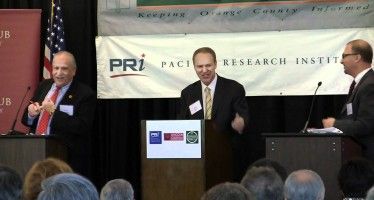Previewing Gov. Brown's State Address
JAN. 31, 2011
By KATY GRIMES
With Californians poised to hear Gov. Jerry Brown’s State of the State address this evening, many of them want more details about his recent budget proposals. Brown set the stage with a recent state of emergency declaration amidst the state’s $25.4 billion deficit and rising 12.5 percent unemployment. His speech will try to convince California voters of the need to approve a June ballot initiative extending higher taxes.
Californians have rejected tax hikes in the past seven elections, making passage of Brown’s tax increase extension questionable. And it does not appear that Brown has a ‘plan B’ in his playbook, leaving many analysts asking whether his address will shed some light on his plans should the tax increase fail, and offer more detail into his budget proposal.
Earlier in the month, Brown proposed an ambitious budget plan to eliminate the state’s deficit and budget shortfall using spending cuts, borrowing, tax increases, and somehow locating $1.9 billion in “other unspecified solutions,” in order to provide for a $1 billion reserve. The 2009 tax increases are estimated to net $12 billion, and they include a 1 cent increase in the state’s sales tax, a 0.25 percentage point increase in the state income tax and an increase in the vehicle license fee rate.
“Republicans are not happy with the request for tax increases,” said Assemblywoman Diane Harkey, R-Dana Point. “I’ve been through five budget Kabuki dances in the two years I’ve been at the Capitol.” Harkey described Brown’s budget proposal as “a shot across the bow,” and suggested that there will be more detail to come when he realizes that taxpayers won’t approve tax increases.
Brown has said that the budget changes will be painful, people will have to make sacrifices, and that everyone in the state, including public sector employees, will be sharing in the pain. And perhaps to show that he means business, Brown recently required that at least half of the cell phones used by state workers’ be turned back in, as well as many of the state-issued vehicles.
According to Brown’s budget proposal, in addition to the substantial cuts to Medi-Cal, CalWORKs, and the state’s universities, state employees pay will be cut by 10 percent – but only state employees not currently covered under collective bargaining agreements: State attorneys, hearing officers, administrative law Judges, the Statewide Law Enforcement Association, the California Correctional Peace Officers Association, engineers and scientists. “$308 million is the estimated savings with the 10 percent pay cuts to these employee groups, and represents collectively, 51,000 rank and file positions,” explained H.D. Palmer with the Department of Finance.
Part of Brown’s plan for cutting the state’s budget is through a “realignment of services,” rehashing an old plan that shifts state program costs to the counties. Whether it is called “realignment,” or “local control,” or “government closer to the people,” Brown and other state Democratic legislators have been working on this restructuring option for several years.
Brown said that his realignment plan will return decisions and authority to cities, counties and schools, and will “allow government at all levels to focus on core functions and become more efficient and less expensive” through reductions in duplicative services and administrative costs.
“The actual proposed cuts amount to $6 to $10 billion, and not $12 billion as the governor said,” reported Harkey. She said that California is facing an actual structural deficit of $40 billion to $70 billion. “Governor Brown has a dilemma. With no permanent reduction in spending, we just continue to feed the beast. Facing this structural deficit, last year the Legislature accepted federal stimulus money. We have borrowed from 100 internal accounts, maxed-out our borrowing capacity and are making deficit payments, and continue using accounting gimmicks.”
During his inauguration earlier this month, Brown warned that “the year ahead will demand courage and sacrifice.”
Harkey said she hopes Brown can work around the special interests that got him elected, in order to come up with real solutions to the state’s crisis. “The public employee unions, the teacher’ association and environmentalists were instrumental in getting Brown elected. But I think that if he can convince his people to make the reductions immediately, he could be the one to fix the budget – otherwise, we’re sunk.”
The governor’s state of the state address begins tonight at 5:00.
Related Articles
Greenhut-Berardino Debate on Pensions
APRIL 27, 2011 By JOHN SEILER It was the Great Pension Debate. Yesterday Steven Greenhut, editor-in-chief of CalWatchDog.com, debated Nick
Democrats mostly silent on UC strike amid declining union approval
As public opinion in California turns against labor unions, few Democrat politicians — most of whom rely on union support
CA drought brings fines, shaming
After a wave of new rules, regulations and crackdowns, many water-conserving Californians have evaded formal and informal punishment. With no




